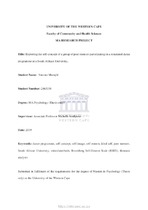| dc.contributor.advisor | Andipatin, Michelle | |
| dc.contributor.author | Momplé, Simone | |
| dc.date.accessioned | 2020-11-27T12:53:22Z | |
| dc.date.available | 2020-11-27T12:53:22Z | |
| dc.date.issued | 2020 | |
| dc.identifier.uri | http://hdl.handle.net/11394/7592 | |
| dc.description | Magister Artium (Psychology) - MA(Psych) | en_US |
| dc.description.abstract | This study focuses and draws on the fields of dance, psychology and the self-concept. Dance is seen as a powerful tool for expression of self. The Self-Concept is one of the most researched constructs in psychology. Previous research has focused on one element of the self-concept, such as self-esteem; this research considered the self-concept holistically, comprising of: self-image, self-esteem and ideal self. The theoretical framework of this research was the Self-Concept, and dance was employed as an intervention or method of researching the self-concept.
The overall aim of this research was to explore the self-concept of a group of peer mentors prior to and after participating in a structured dance programme at a South African University. This research used a mixed-method approach with the primary method being qualitative. The quantitative research design was a quasi-experimental, one-group pre-test post-test design, using the Rosenberg Self-Esteem Scale (RSES). The qualitative research design was ethnography. A seven session structured dance programme was conducted consisting of various aspects of dance. Non-probability sampling and purposive sampling techniques were used. Data was collected in four phases; quantitative pre-test data collection using the RSES scale; qualitative intervention data collection via observations (field notes and audio-visual recordings); quantitative post-test data collection using the RSES scale; and qualitative in-depth interviews. Informed consent was received through informed consent forms and information sessions prior to the dance programme. There were two steps of data analysis. First was to analyse the quantitative data from the RSES on IBM’s Statistical Software Package for Social Sciences, version 25 (SPSS v.25) and Microsoft Excel tools. Second was to analyse the data from the observations and interviews using thematic analysis. | en_US |
| dc.language.iso | en | en_US |
| dc.publisher | University of Western Cape | en_US |
| dc.subject | Higher education | en_US |
| dc.subject | Mentorship | en_US |
| dc.subject | Dance | en_US |
| dc.subject | Self-concept | en_US |
| dc.subject | Self esteem | en_US |
| dc.subject | Self image | en_US |
| dc.subject | Self concept | en_US |
| dc.subject | Rosenberg Self-Esteem Scale (RSES) | |
| dc.subject | South Africa | |
| dc.title | Exploring the self-concept of a group of peer mentors participating in a structured dance programme at a South African University | en_US |
| dc.rights.holder | University of Western Cape | en_US |

